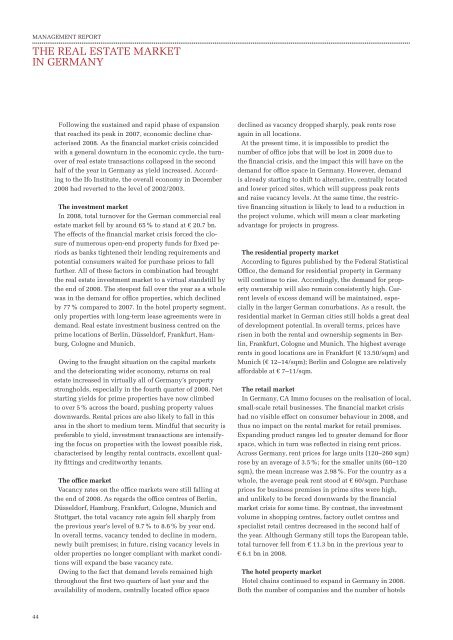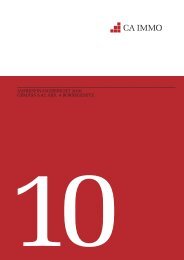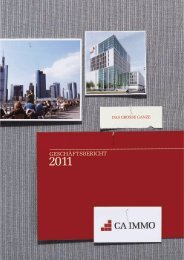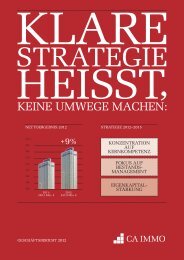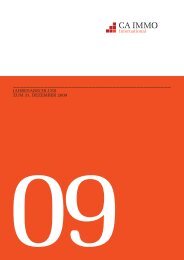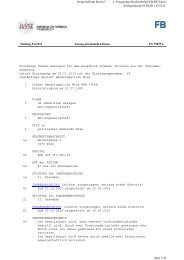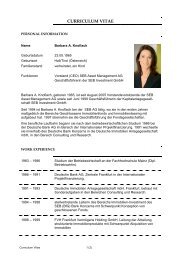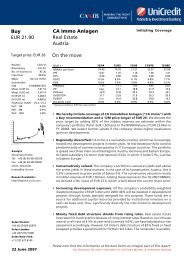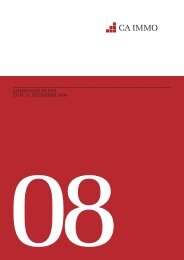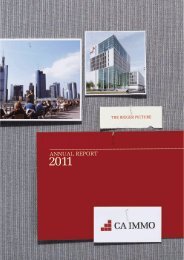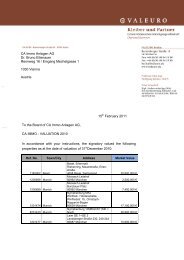CA Immo Annual Report 2008 (.pdf)
CA Immo Annual Report 2008 (.pdf)
CA Immo Annual Report 2008 (.pdf)
Create successful ePaper yourself
Turn your PDF publications into a flip-book with our unique Google optimized e-Paper software.
MAnAGeMent RepoRt<br />
tHe ReAl eStAte MARKet<br />
In GeRMAny<br />
44<br />
Following the sustained and rapid phase of expansion<br />
that reached its peak in 2007, economic decline characterised<br />
<strong>2008</strong>. As the financial market crisis coincided<br />
with a general downturn in the economic cycle, the turnover<br />
of real estate transactions collapsed in the second<br />
half of the year in Germany as yield increased. According<br />
to the Ifo Institute, the overall economy in December<br />
<strong>2008</strong> had reverted to the level of 2002/2003.<br />
The investment market<br />
In <strong>2008</strong>, total turnover for the German commercial real<br />
estate market fell by around 65 % to stand at € 20.7 bn.<br />
the effects of the financial market crisis forced the closure<br />
of numerous open-end property funds for fixed periods<br />
as banks tightened their lending requirements and<br />
potential consumers waited for purchase prices to fall<br />
further. All of these factors in combination had brought<br />
the real estate investment market to a virtual standstill by<br />
the end of <strong>2008</strong>. the steepest fall over the year as a whole<br />
was in the demand for office properties, which declined<br />
by 77 % compared to 2007. In the hotel property segment,<br />
only properties with long-term lease agreements were in<br />
demand. Real estate investment business centred on the<br />
prime locations of Berlin, Düsseldorf, Frankfurt, Hamburg,<br />
Cologne and Munich.<br />
owing to the fraught situation on the capital markets<br />
and the deteriorating wider economy, returns on real<br />
estate increased in virtually all of Germany’s property<br />
strongholds, especially in the fourth quarter of <strong>2008</strong>. net<br />
starting yields for prime properties have now climbed<br />
to over 5 % across the board, pushing property values<br />
downwards. Rental prices are also likely to fall in this<br />
area in the short to medium term. Mindful that security is<br />
preferable to yield, investment transactions are intensifying<br />
the focus on properties with the lowest possible risk,<br />
characterised by lengthy rental contracts, excellent quality<br />
fittings and creditworthy tenants.<br />
The office market<br />
Vacancy rates on the office markets were still falling at<br />
the end of <strong>2008</strong>. As regards the office centres of Berlin,<br />
Düsseldorf, Hamburg, Frankfurt, Cologne, Munich and<br />
Stuttgart, the total vacancy rate again fell sharply from<br />
the previous year’s level of 9.7 % to 8.6 % by year end.<br />
In overall terms, vacancy tended to decline in modern,<br />
newly built premises; in future, rising vacancy levels in<br />
older properties no longer compliant with market conditions<br />
will expand the base vacancy rate.<br />
owing to the fact that demand levels remained high<br />
throughout the first two quarters of last year and the<br />
availability of modern, centrally located office space<br />
declined as vacancy dropped sharply, peak rents rose<br />
again in all locations.<br />
At the present time, it is impossible to predict the<br />
number of office jobs that will be lost in 2009 due to<br />
the financial crisis, and the impact this will have on the<br />
demand for office space in Germany. However, demand<br />
is already starting to shift to alternative, centrally located<br />
and lower priced sites, which will suppress peak rents<br />
and raise vacancy levels. At the same time, the restrictive<br />
financing situation is likely to lead to a reduction in<br />
the project volume, which will mean a clear marketing<br />
advantage for projects in progress.<br />
The residential property market<br />
According to figures published by the Federal Statistical<br />
office, the demand for residential property in Germany<br />
will continue to rise. Accordingly, the demand for property<br />
ownership will also remain consistently high. Current<br />
levels of excess demand will be maintained, especially<br />
in the larger German conurbations. As a result, the<br />
residential market in German cities still holds a great deal<br />
of development potential. In overall terms, prices have<br />
risen in both the rental and ownership segments in Berlin,<br />
Frankfurt, Cologne and Munich. the highest average<br />
rents in good locations are in Frankfurt (€ 13.50/sqm) and<br />
Munich (€ 12–14/sqm); Berlin and Cologne are relatively<br />
affordable at € 7–11/sqm.<br />
The retail market<br />
In Germany, <strong>CA</strong> <strong>Immo</strong> focuses on the realisation of local,<br />
small-scale retail businesses. the financial market crisis<br />
had no visible effect on consumer behaviour in <strong>2008</strong>, and<br />
thus no impact on the rental market for retail premises.<br />
expanding product ranges led to greater demand for floor<br />
space, which in turn was reflected in rising rent prices.<br />
Across Germany, rent prices for large units (120–260 sqm)<br />
rose by an average of 3.5 %; for the smaller units (60–120<br />
sqm), the mean increase was 2.98 %. For the country as a<br />
whole, the average peak rent stood at € 60/sqm. purchase<br />
prices for business premises in prime sites were high,<br />
and unlikely to be forced downwards by the financial<br />
market crisis for some time. By contrast, the investment<br />
volume in shopping centres, factory outlet centres and<br />
specialist retail centres decreased in the second half of<br />
the year. Although Germany still tops the european table,<br />
total turnover fell from € 11.3 bn in the previous year to<br />
€ 6.1 bn in <strong>2008</strong>.<br />
The hotel property market<br />
Hotel chains continued to expand in Germany in <strong>2008</strong>.<br />
Both the number of companies and the number of hotels


